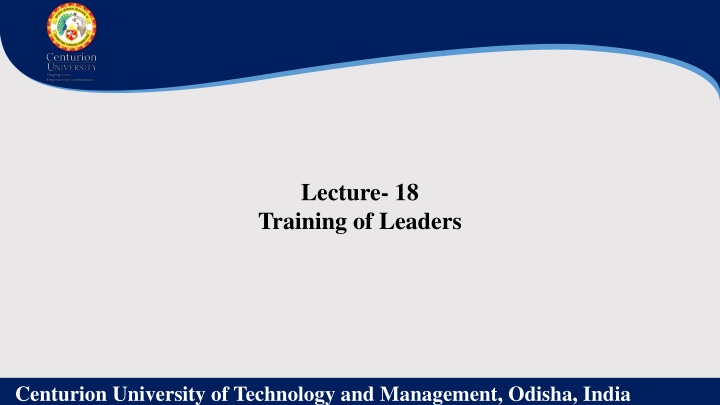
Training of Leaders in Extension Work: Essential Techniques and Objectives
Discover the significance of training leaders in extension work to enhance their leadership qualities and capabilities. Explore the importance of timing and content in farmer training programs to optimize learning outcomes.
Download Presentation

Please find below an Image/Link to download the presentation.
The content on the website is provided AS IS for your information and personal use only. It may not be sold, licensed, or shared on other websites without obtaining consent from the author. If you encounter any issues during the download, it is possible that the publisher has removed the file from their server.
You are allowed to download the files provided on this website for personal or commercial use, subject to the condition that they are used lawfully. All files are the property of their respective owners.
The content on the website is provided AS IS for your information and personal use only. It may not be sold, licensed, or shared on other websites without obtaining consent from the author.
E N D
Presentation Transcript
Lecture- 18 Training of Leaders Centurion University of Technology and Management, Odisha, India
Training the leaders Need for training- Persons identified as leaders may sometimes lack some of the essential attributes of leadership and may not be up-to-date in their knowledge and experience. Therefore make best use of them as leaders in extension work, they need to be given adequate training to improve their caliber, and develop their latent capacities for leadership. Objectives of training: According to Singh (1987) the training objectives is to: i. Attract the genuinely interested persons who are either self motivated or externally stimulated to take part in the course, ii. Impart new knowledge, teach better skills and bring about the desirable changes in their behaviour, iii. Place the latest knowledge in the hands of desirous persons, iv. Develop acquaintance between the farmers and specialists and also the scientists, v. Encourage mutual exchange of experience among the participating farmers, vi. Pave way for the flow of problems of farmers to the research system and vii. Enhance faith in the research findings. Centurion University of Technology and Management, Odisha, India
When to organize farmer's training- The following pre-requisites are essential or the success of training programmes. i. Availability of sound technology that is superior to the prevalent practice. ii. Farmers realize that by adoption of technology they can get more profit. iii. Qualified and trained personnel who can successfully transmit new technology. iv. A desire on the part of the farmers on the specialized topic. v. There are increasing numbers of problems that can be solved by the specialists rather than a generalist. vi. There is large segment of clientele which is neither affluent enough to take initiative to obtain information individually by their places to pick any ideas. extension workers and local leaders. Centurion University of Technology and Management, Odisha, India
In view of the above pre-requisites it can be hypothecated that there is a necessity to train the farmers. These training programmes for farmers should be timed so as to synchronise with slack seasons or periods when the local leaders will have leisure or relatively less pressing items of work. It has also been found more desirable to have training camps of short duration of 3 to 5 days, followed by frequent and systematic contacts between. Where to Train- Using well-established training institutions for this purpose has been found to have some disadvantages such as: i. The need for leaders to travel long distance and stay at the institutes resulting in more expenditure in terms of both money and time, and ii. The nature of training imparted by such institutions is not of local interest to the trainees. Due to the above limitations the trainings are conducted in local environment itself (i.e.) in villages, providing training to leaders in their own home environment are becoming popular in several places Centurion University of Technology and Management, Odisha, India
What to Train i. Theoretical information should always be related to practical situations at every step. ii. The subject should be in the nature of problems encountered by the local leaders in their respective areas. Hence the content of the training programme should be problem-centered. iii. The following contents may be considered. a) aims of rural development b) leadership in rural society c) community organisation principles, methods and techniques including methods of stimulating group thinking, group planning and group action. d) Co-operative principles and methods with particular reference to coordination of local bodies. e) Practical activities of community life like education, recreation, anti-crime, public health, agriculture etc. Centurion University of Technology and Management, Odisha, India
How to Train- There can be either informal methods or formal method of training. Informal Methods: It may be (i) Observation, (i.e.) noticing how others have performed. This may be a visit to farmer's holdings; (ii) Reading the printed literature, circular letters, etc. from community development workers and (iii) Talking with other leaders progressive farmers or others in the field of interest. Formal Methods: Lecture. It may be supplemented with other formal methods, Discussion and workshop, Forum, panel or symposium, Audio-visual aids, Field trips, Centurion University of Technology and Management, Odisha, India
Apprenticeship-learning things by staying with others who have adopted improved practices, Training groups formal leader training camps, Direct assistance from experts, Buzz group-discussion by all in the group of less than seven persons and Giving responsibility to local leaders so that they develop self confidence. Centurion University of Technology and Management, Odisha, India
Suggestions for Improving Farmer's Training- a) Training must reach the farmers where they are. Attendance of institutional training will always be thin than off-campus training. Further in institutional training participating farmers feel that many innovations demonstrated on institute farms may not be successful at their own farms. It is always better to have the training in villages. b) Training must be directed, especially to farmer's present interests and needs. It should also be directed to the farmer's monetary interests. c) Training must accept the fact that the trainees are adult farmers. They are not children. So they should not be trained in the way children are trained. d) Training must be fitted into the period when farmers are not too busy, during evening or off-season. e) The subject must be a new or changed practice, explaining why is it? Why it is superior, how can it be carried out? etc. Farmers need encouragement to try things. Acquiring knowledge and skill, is not enough. They also need encouragement to try out new practices. Centurion University of Technology and Management, Odisha, India






















